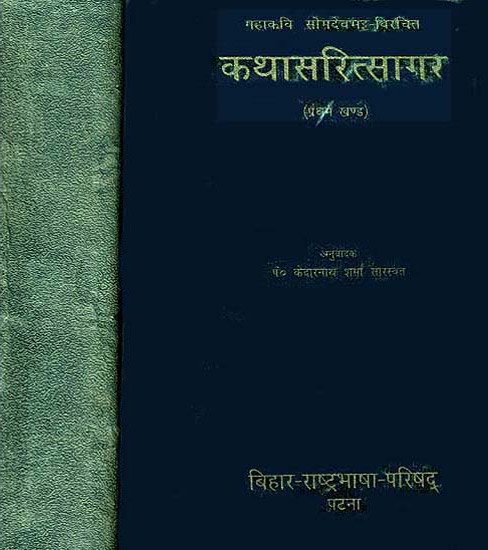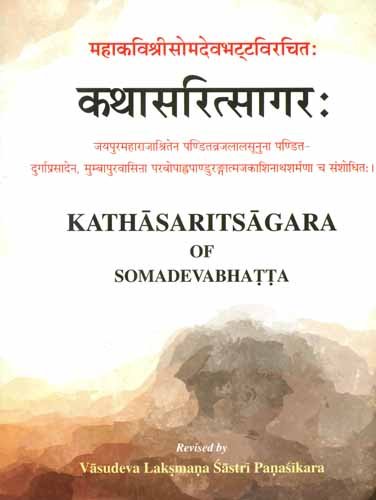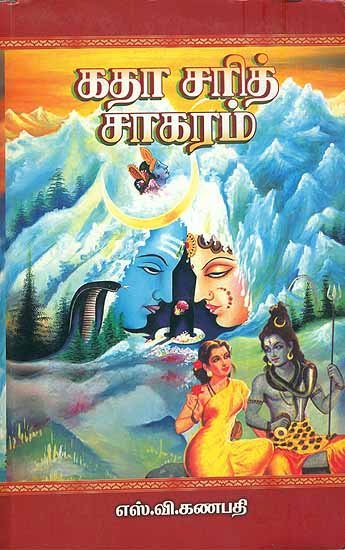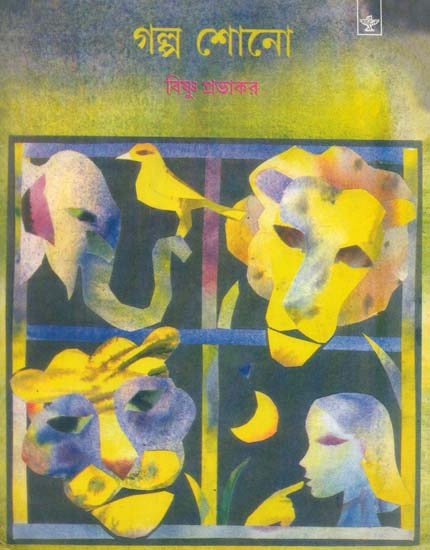Kathasaritsagara [sanskrit]
by C. H. Tawney | 2014 | 226,424 words | ISBN-13: 9789350501351
The Sanskrit edition of the Kathasaritsagara referencing the English translation and grammatical analysis. Written by Somadeva and dating from the 12th century, the Kathasaritsagara (or Katha-sarit-sagara) represents an epic legend narrating the adventures of Naravahanadatta as he strives to become the destined emperor of the Vidyadharas. Alternative titles: (Kathāsaritsāgara, कथासरित्सागर, Kathā-sarit-sāgara)
Verse 18.1.132
इत्य् उक्त्वा विनयेन मुक्तवहना पद्भ्यां व्रजन्ती पथि प्रह्वा सा नयति स्म तौ सुवदना स्वर्गोपमं स्वं पुरम् ।
नानारत्नविचित्रहेमरचितं द्वारेषु नानायुधैर् नानारूपधरैश् च वीरपुरुषैर् अध्यासितं सर्वतः ॥ १३२ ॥
ity uktvā vinayena muktavahanā padbhyāṃ vrajantī pathi prahvā sā nayati sma tau suvadanā svargopamaṃ svaṃ puram |
nānāratnavicitrahemaracitaṃ dvāreṣu nānāyudhair nānārūpadharaiś ca vīrapuruṣair adhyāsitaṃ sarvataḥ || 132 ||
The English translation of Kathasaritsagara Verse 18.1.132 is contained in the book The Ocean of Story by C.H. Tawney. This book is available online or you could buy the latest edition:
Read online Buy now! The English translation by C.H. Tawney (2014)
Glossary of Sanskrit terms
Note: This extracts Sanskrit terms and links to English definitions from the glossary, based on an experimental segmentation of verse (18.1.132). Some terms could be superfluous while some might not be mentioned. Click on the word to show English definitions.
Uktva, Vinaya, Mukta, Vahana, Pat, Pad, Vrajat, Vrajanti, Pathin, Pathi, Prahva, Nayat, Sma, Suvadana, Svarga, Upama, Sva, Pur, Pura, Nanaratna, Vicitra, Hema, Heman, Racita, Dvara, Nanayudha, Nanarupadhara, Virapurusha, Adhyasita, Sarvatah, Sarvata,
Analysis of Sanskrit grammar
Note: this is an experimental feature and only shows the first possible analysis of the Sanskrit text (Kathasaritsagara Verse 18.1.132). If the system was successful in segmenting the sentence, you will see of which words it is made up of, generally consisting of Nouns, Pronouns, Verbs, Participles and Indeclinables. Click on the link to show all possible derivations of the word.
- Line 1: “ity uktvā vinayena muktavahanā padbhyāṃ vrajantī pathi prahvā sā nayati sma tau suvadanā svargopamaṃ svaṃ puram ”
- Cannot analyse ity*uk
- uktvā -
-
uktvā (indeclinable)[indeclinable]√vac -> uktvā (absolutive)[absolutive from √vac]√vac -> uktvā (absolutive)[absolutive from √vac]
- vinayena -
-
vinaya (noun, masculine)[instrumental single]vinaya (noun, neuter)[instrumental single]
- mukta -
-
mukta (noun, masculine)[compound], [vocative single]mukta (noun, neuter)[compound], [vocative single]√muc -> mukta (participle, masculine)[vocative single from √muc class 6 verb]√muc -> mukta (participle, neuter)[vocative single from √muc class 6 verb]√muc -> mukta (participle, masculine)[vocative single from √muc class 1 verb]√muc -> mukta (participle, neuter)[vocative single from √muc class 1 verb]√muj -> mukta (participle, masculine)[vocative single from √muj class 1 verb]√muj -> mukta (participle, neuter)[vocative single from √muj class 1 verb]
- vahanā -
-
vahanā (noun, feminine)[nominative single]
- padbhyām -
-
pat (noun, masculine)[instrumental dual], [dative dual], [ablative dual]pat (noun, neuter)[instrumental dual], [dative dual], [ablative dual]pad (noun, masculine)[instrumental dual], [dative dual], [ablative dual]
- vrajantī -
-
√vraj -> vrajat (participle, neuter)[nominative dual from √vraj class 1 verb], [vocative dual from √vraj class 1 verb], [accusative dual from √vraj class 1 verb]√vraj -> vrajantī (participle, feminine)[nominative single from √vraj class 1 verb]
- pathi -
-
pathin (noun, masculine)[compound], [adverb], [locative single]pathī (noun, masculine)[adverb], [vocative single]pathī (noun, feminine)[compound], [adverb], [vocative single]pathī (noun, neuter)[compound], [adverb], [nominative single], [vocative single], [accusative single]
- prahvā -
-
prahvā (noun, feminine)[nominative single]
- sā* -
-
so (noun, feminine)[accusative plural]
- nayati -
-
nayat (noun, masculine)[locative single]nayat (noun, neuter)[locative single]√nay -> nayat (participle, masculine)[locative single from √nay class 1 verb]√nay -> nayat (participle, neuter)[locative single from √nay class 1 verb]√nī -> nayat (participle, masculine)[locative single from √nī class 1 verb]√nī -> nayat (participle, neuter)[locative single from √nī class 1 verb]√nay (verb class 1)[present active third single]√nī (verb class 1)[present active third single]
- sma -
-
sma (indeclinable)[indeclinable]sman (noun, masculine)[compound]
- tau -
-
ta (noun, masculine)[nominative dual], [vocative dual], [accusative dual]sa (noun, masculine)[nominative dual], [accusative dual]
- suvadanā -
-
suvadanā (noun, feminine)[nominative single]
- svargo -
-
svarga (noun, masculine)[compound], [vocative single]svarga (noun, neuter)[compound], [vocative single]svargā (noun, feminine)[nominative single]
- upamam -
-
upama (noun, masculine)[adverb], [accusative single]upama (noun, neuter)[adverb], [nominative single], [accusative single]upamā (noun, feminine)[adverb]
- svam -
-
sva (noun, masculine)[adverb], [accusative single]svan (noun, masculine)[adverb]svan (noun, neuter)[adverb]sva (noun, neuter)[nominative single], [accusative single]
- puram -
-
pura (noun, masculine)[adverb], [accusative single]pura (noun, neuter)[adverb], [nominative single], [accusative single]purā (noun, feminine)[adverb]pur (noun, feminine)[accusative single]
- Line 2: “nānāratnavicitrahemaracitaṃ dvāreṣu nānāyudhair nānārūpadharaiś ca vīrapuruṣair adhyāsitaṃ sarvataḥ ”
- nānāratna -
-
nānāratna (noun, masculine)[compound], [vocative single]nānāratna (noun, neuter)[compound], [vocative single]
- vicitra -
-
vicitra (noun, masculine)[compound], [vocative single]vicitra (noun, neuter)[compound], [vocative single]
- hema -
-
hema (noun, masculine)[compound], [vocative single]hema (noun, neuter)[compound], [vocative single]heman (noun, masculine)[compound]heman (noun, neuter)[compound], [adverb], [nominative single], [vocative single], [accusative single]
- racitam -
-
racita (noun, masculine)[adverb], [accusative single]racita (noun, neuter)[adverb], [nominative single], [accusative single]racitā (noun, feminine)[adverb]√rac -> racita (participle, masculine)[accusative single from √rac class 10 verb]√rac -> racita (participle, neuter)[nominative single from √rac class 10 verb], [accusative single from √rac class 10 verb]
- dvāreṣu -
-
dvāra (noun, masculine)[locative plural]dvāra (noun, neuter)[locative plural]
- nānāyudhair -
-
nānāyudha (noun, masculine)[instrumental plural]nānāyudha (noun, neuter)[instrumental plural]
- nānārūpadharaiś -
-
nānārūpadhara (noun, masculine)[instrumental plural]nānārūpadhara (noun, neuter)[instrumental plural]
- ca -
-
ca (indeclinable conjunction)[indeclinable conjunction]ca (noun, masculine)[compound], [vocative single]ca (noun, neuter)[compound], [vocative single]
- vīrapuruṣair -
-
vīrapuruṣa (noun, masculine)[instrumental plural]
- adhyāsitam -
-
adhyāsita (noun, masculine)[adverb], [accusative single]adhyāsita (noun, neuter)[adverb], [nominative single], [accusative single]adhyāsitā (noun, feminine)[adverb]
- sarvataḥ -
-
sarvataḥ (indeclinable)[indeclinable]sarvata (noun, masculine)[nominative single]
Other editions:
Also see the following editions of the Sanskrit text or (alternative) English translations of the Kathasaritsagara Verse 18.1.132
Kathasaritsagar
by Kedarnath Sharma Saraswat (2005)
The Only Edition with the Sanskrit Text and its Hindi Translation (An Old and Rare Book) Set of 3 Vol.
Buy now!
Kathasaritsagara of Somadeva Bhatta (Sanskrit Text Only)
by Vasudeva Laksmana Sastri (2013)
Katha Sarit Sagar in Marathi
by H. A Bhave (1995)
Set of 5 Volumes; Published by Varada Books, Pune. 2256 pages (Throughout B/W Illustrations).
Buy now!
Katha Sarit Sagara (Tamil)
by S. V. Ganapati (எஸ். வி. கணபதி) (2014)
[கதா சரித் சாகரம்] Published by Alliance Publications.
Buy now!
Galpa Shono
by Abhijit Chattopadhyay (2014)
[গল্প শোনো] Galpa Shono: Bengali Translation of 'Suno Kahani From Katha Sarit Sagar'; 9788126015436; Published by Sahitya Akademi, Delhi.
Buy now!Preview of verse 18.1.132 in Bengali sript:
ইত্য্ উক্ত্বা বিনযেন মুক্তবহনা পদ্ভ্যাং ব্রজন্তী পথি প্রহ্বা সা নযতি স্ম তৌ সুবদনা স্বর্গোপমং স্বং পুরম্ ।
নানারত্নবিচিত্রহেমরচিতং দ্বারেষু নানাযুধৈর্ নানারূপধরৈশ্ চ বীরপুরুষৈর্ অধ্যাসিতং সর্বতঃ ॥ ১৩২ ॥
![Kathasaritsagara [sanskrit] - book cover](/uploads/a/Katha-Sarit-Sagara.jpg)




